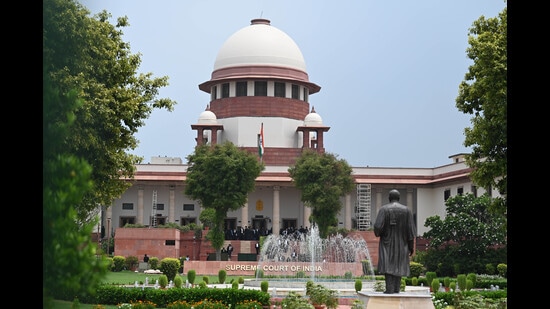Jul 26, 2024 09:21 PM IST
At the heart of the judgment is the Court’s observation that “words cultivate institutional discrimination” — an unmistakable recognition of the power of words to impact a community’s lived realities.
The Supreme Court (SC)’s recent judgment in Nipun Malhotra v. Sony Pictures breaks new ground. The case arose from the release of Aankh Micholi, a film that insensitively portrayed the physiological barriers faced by persons with disabilities (PwDs). To illustrate, the film refers to those with speech impairments as “atki hui cassette.” The case of the appellants before the SC was simple, urging the Court to emphasise that ableism was not funny. But, at the same time, the Court was confronted with a delicate adjudicatory exercise of balancing the right to cinematic freedom with the constitutional obligation of the State to prevent the perpetuation of discriminatory attitudes. At the heart of the judgment is the Court’s observation that “words cultivate institutional discrimination” — an unmistakable recognition of the power of words to impact a community’s lived realities.

The judgment marks a benchmark as far as rights, representation, and recognition of PwDs are concerned. At the same time, the Court could have gone further in granting practical remedies.
The judgment reaffirms that dignity and humour are not the sole preserve of the able-bodied. It shows that the exploitation of our emotional vulnerabilities is also the subject of fundamental rights, of no less import than the provision of job security (UoI v National Federation of Blind, 2013), equal opportunities in public recruitment (Vikash Kumar, 2021) and fairness in conditions of service (Ravindra Dhariwal, 2021).
It is worth noting that this has not always been the case: In 2020, Madras high court (HC) dismissed a writ petition filed by M Karpagam challenging the official terminology divyang (translating into person with “divine” body parts). The HC, in that case, did not even consider the impact of ableist language on disability rights and advised the petitioner to pay “greater emphasis…on the effective measures adopted by the State rather than following the fad of political correctness as to the expressions used to describe them.” What is notable is the SC’s rejection of the false binary between words and action. The SC tells us that the language of our discourse, as much as its substantive outcomes, must be grounded in a recognition of the dignity of persons with disabilities.
There is no gainsaying that over-protectionism is the antithesis of equal protection. The SC emphasises the importance of ensuring that the representation of PwDs is balanced and realistic, showcasing the multiple layers of their identities. This balance is critical in that it recognises that the way to deal with a negative portrayal of PwDs is not by depicting them as being specially or differently abled, endowed with some divine features. Rather, the correct way to depict PwDs is by providing a realistic portrayal of their disability, as one facet of their complex identities.
The Court emphasises the importance of involving persons with disabilities in decisions about their portrayal. It states that they must be part of statutory and expert committees that are formed to sanction films that depict PwDs.
At the level of remedy, the Court does not grant any of the remedies sought by the appellant — bleeping out objectionable parts of the film, directing Sony Pictures to make a fresh awareness film about persons with disabilities, directing consultation with persons with disabilities or the formulation of guidelines. It offers a compelling legal justification for each of these moves. To illustrate, the direction for bleeping could not be granted as the film had been sanctioned. However, it then goes on to offer some suggestions on the portrayal of PwDs.
The legal character of these pointers is not immediately apparent. Given that these come from the SC, their discursive value is undeniable, but their legal force remains to be seen in subsequent cases. The Court would have done well to direct compliance with its suggestions and ensure that a stakeholder consultation be held by film certification bodies on the dignified portrayal of PwDs. These directions would not have been legally objectionable and would have offered a concrete blueprint to operationalise the Court’s suggestions.
Rahul Bajaj is the co-founder of Mission Accessibility, a senior associate fellow (disability rights) at the Vidhi Centre for Legal Policy, adjunct faculty, BMU School of Law and a practising advocate in the courts of Delhi. Prannv Dhawan is an advocate. Both Bajaj and Dhawan are former judicial law clerks at the Supreme Court of India. The views expressed are personal
Story Saved


